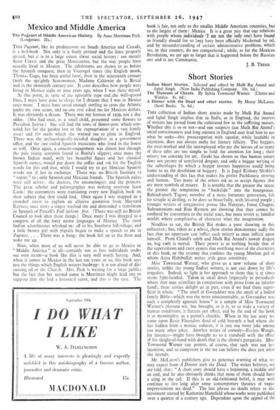Mexico and Middle America
The Pageant of Middle American History. By Anne Merriman Peck. (Longmans. 21s.) The Pageant of Middle American History. By Anne Merriman Peck. (Longmans. 21s.) Tills Pageant, like its predecessors on South -America and Canada, is a bed-book. Not only is it finely printed and the lines properly spaced, but it is to a large extent about social history: not merely Stout Cortes and the great Montezuma, but the way people have actually lived in Mexico. The inhabitants are shown to us before the Spanish conquest, then in Viceregal times (the English monk, Thomas Gago, has been useful here), then in the nineteenth century (with the sprightly Scotswoman, Madame Calderon de la Berea) and in the twentieth century too. It even describes how people were living in Mexico eight or nine years ago, when I was there myself. At this point, in spite of the agreeable type and-the well-spaced lines, I must have gone to sleep; for I dreamt that I was in Mexico once more. I must have saved enough sterling to cross the Atlantic under my own steam, and no one ever asked me for. Mexican dollars. It was obviously a dream: There was my hosteia of 1939, not a day older. (She had once, as a small child, presented some flowers to President Juarez.) She still had the rows of flower-pots which con- soled her for the garden lost in the expropriation of a vast family estate and the seeds which she wanted me to plant in England. There was the archaeologically-minded daughter in a government office, and the two exiled Spanish musicians who lived in the house as well. Once again, a concert-engagerhent was almost lost through the pale young scorpion found in Rosita's slipper; once more the brown Indian maid, with- her beautiful figure and her classical Spanish names, would put down the coffee and ask for the English words for this and that, while I would try to get Mexican Spanish words out of her in exchange. There was no British Institute to " report " to ; only Spanish and Mexican friends. The Spanish exiles were still active : the doctors, the entomologists and the printers. The great scholar and palaeographer was making everyone learn Latin : the economists were translating every new English book on their subject that they could find. Once again I was stopped in a crowded street to explain an allusive quotation from Maynard Keynes; once more a singer waylaid me and demanded a translation in Spanish of Purcell's Full fathom five. (There was still no British Council to look after these things.) Once more I was dragged to a congress of all the forty native languages of Mexico. The rural Indian schoolmaster whisked me off to his Southern hill-village, and a little brown girl with pigtails began to make a speech to me in Zapotec. . . . There was a bang: the book fell on to the floor and woke me up.
Now, when most of us will never be able to go to Mexico or " Middle America " at all—certainly not as free individuals under our own steam—a book like this is very well worth having. And, when it comes to Mexico in the last ten years or so, this book says just the things which English writers hushoup: it is not afraid of dis-- cussing oil or the Church. Mrs. Peck is writing for a large public; • but the fact that her second name is Merriman might lead one to suppose that she had a historical sense, and this is the case. The book is fair, not only to the smaller Middle American countries, but to the largest of them: Mexico. It is a great pity that our relations with people whom individuals (I am not the only one) have found so friendly should for so long have been officially blackened by oil, and by misunderstanding of certain administrative problems which we, in this country, do not comprehend ; while, as for the Mexican Revolution, we are apt to forget that it happened before the Russian one and is not Communist.
J. B. TREND.


































 Previous page
Previous page